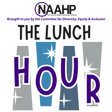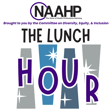
Episode 5: Broadening the Table: Membership, Access, and DEI in NAAHP
In this episode of The Lunch Hour, hosted by the NAAHP Committee on Diversity, Equity, and Inclusion (CDEI), we’re joined by Theresa Blackman from the University of Tennessee Chattanooga—Chair of the NAAHP Membership Committee. Together, we dive into the evolving landscape of NAAHP membership categories, exploring how they intersect with access, inclusion, and the broader work of DEI. Theresa offers insights into the intentional strategies being developed to diversify NAAHP’s membership, the behind-the-scenes efforts of the Membership Committee, and how expanding who’s at the table strengthens our collective impact.
Pull up a seat—this is a conversation about representation, reimagining structures, and building a more inclusive advising community.

